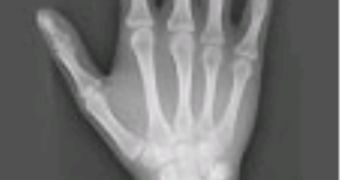Sex hormones in the womb are known to influence the mind, the fingers and the general development. A new research published in the journal "Arthritis & Rheumatism" has found that women with long ring fingers could have a higher rate of knee arthritis. Normally, women should have index and ring fingers of the same length, while men usually possess longer ring fingers.
The new research shows that women with longer ring fingers present a double likelihood of knee arthritis, compared to common situations.
"Specifically, women with the male pattern of length ratio - that is, ring finger relatively longer than the index finger - are more likely to develop knee arthritis. The underlying mechanism of the risk is unclear and merits further exploration", said lead researcher Professor Michael Doherty, from Nottingham University.
His team investigated the hands of 2,000 arthritis patients and 1,000 healthy control subjects, all sexagenarian. The researchers made radiographies of both hands of the subjects, and fingers' length was determined through 3 methods: direct visual assessment of the two finger tips, measurement from base to the tip and measurement of the bone length. The results took into account risk factors like joint injury and sedentariness. Another study had revealed that females with longer ring fingers were generally better sportswomen.
By now, researchers can only guess the cause: partially genetics, but it could also be about increased exposure to male sex hormone testosterone during the uterine development.
The testosterone levels in women (and their wombs) vary a lot from case to case, and the hormone affects bone development (and not only).
Longer ring fingers have been linked by various researches to high womb testosterone exposure. In men, the opposite (a much longer index finger) has been connected to depression and homosexuality. This could be due to high exposure to estrogen, the female sex hormone, in the womb. Women are known to be more prone to depression. The opposite, an extremely short index finger (linked to higher than normal testosterone amounts in the womb) has been linked to increased aggressiveness in children (testosterone induces aggressiveness).
A 2007 research revealed that similarly long ring fingers and index fingers were connected in children to increased skill for numeracy (a more male cognitive ability), while shorter ring fingers were connected to better results at literacy exams (a more female cognitive ability).

 14 DAY TRIAL //
14 DAY TRIAL //